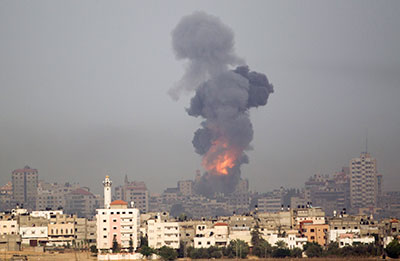On December 2, CPJ sent a letter to Israeli Prime Minister Benjamin Netanyahu requesting an explanation for airstrikes on media facilities during the November 2012 military action in Gaza. The strikes damaged two media buildings and killed and injured a number of journalists. Israeli officials said the military targeted terrorist infrastructure, but provided no explanation of how such a determination was made.
Our concern, as an organization that works globally, extends beyond these incidents to the precedent set by the Israeli action. If governments assert unilateral discretion to target media facilities they deem to be supporting terrorists, then the civilian status conferred on journalists under international humanitarian law would be meaningless.
The same day our letter was issued, Netanyahu spokesman Mark Regev told Agence France-Presse that the Israeli government planned to respond to CPJ through its embassy in Washington, D.C. Eight weeks later, despite several follow-ups on our part, we have yet to receive a response.
This is all the more dismaying because, presumably, the Israeli military had carried out an investigation into the alleged terrorist ties of the targeted media facilities before it launched the strikes. On December 20, our colleagues at Human Rights Watch issued a detailed and comprehensive report on the attacks on Gaza media facilities during “Operation Pillar of Defense.” The report concluded that the strikes violated the laws of war, and through the precedent they set, put journalists all over the world at grave risk. Officials from the Israel Defense Forces did not respond directly to HRW’s request for comment, saying that they were “checking the details of events.”
It goes without saying that Israel faces many challenges, and those challenges are keeping officials busy. Right now, the political leadership in Israeli is focused on forming a new government. But developments in Israel do not explain the apparent decision to stonewall on an issue of critical importance to the international community–namely, the targeting of media facilities during armed conflict.
We’re still hoping for an Israeli response and as soon as we receive it, we will post it to our website.
Editor’s note: The fourth paragraph of this post has been updated to correct the name of the 2012 Israeli military operation, “Operation Pillar of Defense.” A previous version of this post incorrectly referred to the campaign as “Operation Cast Lead,” which is the name of the operation Israel launched in Gaza in December 2008.
